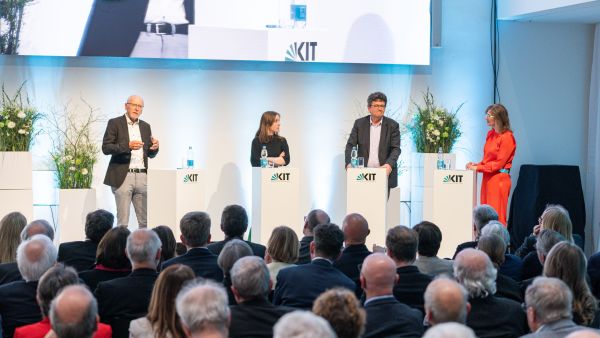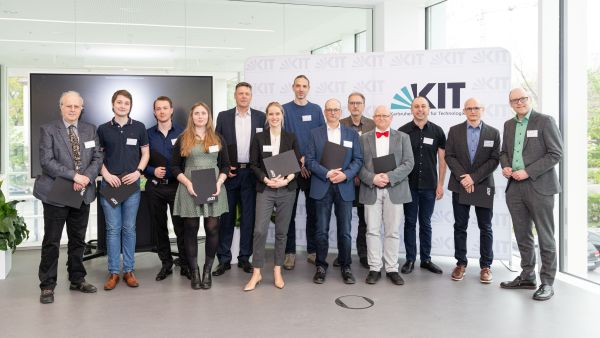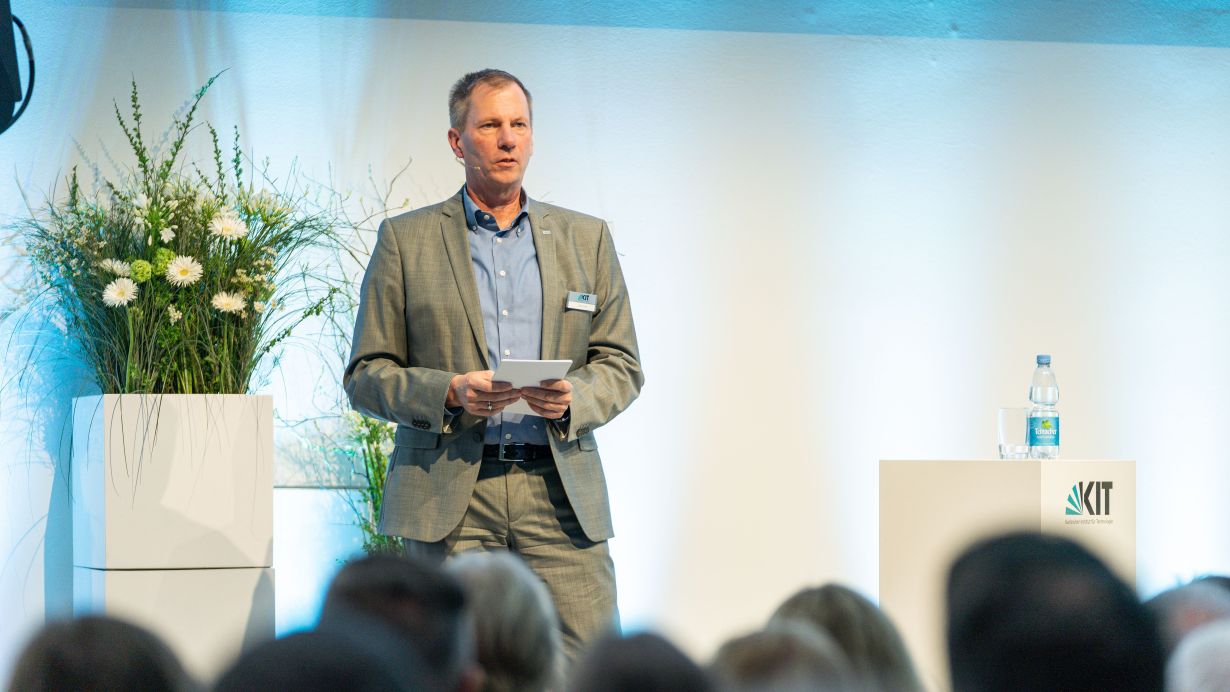Yesterday’s (April 9, 2024) Annual Celebration of Karlsruhe Institute of Technology (KIT) focused on the motto of the Science Year 2024 - Freedom. In the recently opened InformatiKOM building, guests from science, industry, and politics enjoyed a diverse mix of retrospect, stocktaking, discussion, and reflection.
“Freedom,” Professor Oliver Kraft, Acting President of KIT, said, “is no matter of course. We are constantly made aware of that. This also holds for the freedom of science.” In his speech, Kraft emphasized the importance of democratic, open-minded, and tolerant societies: “Only there will findings and ideas develop for the progress of us all.”
Kraft commemorated the recently deceased Founding President of KIT: “We owe visionary pioneers like Professor Horst Hippler our research university. During the first years of its existence, Hippler presided KIT with big courage and care and he engaged tirelessly for the needs of researchers and students.”
KIT Is Accepting Scientific Competition
Kraft reported in detail the activities and achievements of KIT in the past year, such as the establishment of the new KIT Center of Health Technologies, the first joint bridge professorship with the University of Strasbourg, and the significant increase in enrollments for the first semester. He also mentioned KIT’s efforts to transfer research results to innovations, new products, and spinoffs, which earned several awards. As regards the upcoming Excellence Strategy competition and round for the acquisition of program-oriented funding of the Helmholtz Association, Kraft places big trust in KIT: “KIT is the only institution in Germany that participates in both competitions.”
(Video in German)
The celebration started with a scenic performance on the conception of freedom by UniTheater Karlsruhe, KIT’s drama group.
“The motto of the Science Year 2024 also is an important signal for research,” said Petra Olschowski, Baden-Württemberg Minister of Science, Research, and the Arts, in her address. “Freedom of opinion, freedom of science, and freedom of the arts appeared to be matters of course until recently. This has changed. It is worthwhile to place trust in the competence of the science system, the autonomy of which is of highest value. Science and research need room and derive their action options from their own motivation. KIT is an excellent example.”
“For me personally, freedom means respecting borders. Freedom finds fulfillment in limitation. Freedom of self-limitation reflects the freedom for responsibility. In my opinion, freedom of science is closely related to the freedom for responsibility,” said Susanne Kunschert, Member of the Management of Pilz Gmbh & Co. KG and Deputy Chairperson of the KIT Supervisory Board.
Dr. Frank Mentrup, Lord Mayor of Karlsruhe, related to the motto of the celebration to the 75th anniversary of Germany’s Basic Law and to Karlsruhe as “The Residence of Law.” “The discussion of the contribution science can make to preserving and strengthening democracy is important, because scientific findings very often influence the acting of politicians and society directly.” Mentrup also looked ahead to the coming year, in which the city of Karlsruhe and KIT will celebrate the 200th anniversary of KIT and its predecessor institutions.
Freedom of Thinking in Discussion
In the discussion presented by Nicole Krieger, three established researchers of different disciplines of KIT discussed the “Freedom of Thinking – How Do We Protect Science in Times of Crises?” Discussion of Professor Kathrin Gerling from the Institute of Anthropomatics and Robotics, Professor Armin Grunwald from the Institute for Technology Assessment and Systems Analysis, and Professor Holger Puchta from the Joseph Gottlieb Kölreuter Institute for Plant Sciences extended from scientific freedom and curiosity, on the one hand, to material and political constraints, on the other. They concluded that the increasing use of artificial intelligence does not relieve researchers of their task to consider the consequences of what they are doing.

freedom of science can be protected in times of crises. The discussion was presented by Nicole Krieger.
(From left to right, photo: Amadeus Bramsiepe, KIT)
Awards for Research- and Application-oriented Teaching
As in the past years, the KIT Executive Board granted Department Teaching Awards to individuals, teams, and organizational units from the eleven KIT Departments, whose courses are characterized by research- and application-oriented teaching modules, new ways of learning and teaching, high interdisciplinarity, and a high up-to-dateness of the knowledge conveyed.
Professor Alexander Wanner, KIT Vice President Higher Education and Academic Affairs, presented the 2023 Department Teaching Awards in the amount of EUR 10,000 each to a total of eleven teachers and to the Physics Student Representation.

offers. (Photo: Amadeus Bramsiepe, KIT)
To the video series of the KIT Faculty Awards (in German)
Being “The Research University in the Helmholtz Association”, KIT creates and imparts knowledge for the society and the environment. It is the objective to make significant contributions to the global challenges in the fields of energy, mobility, and information. For this, about 10,000 employees cooperate in a broad range of disciplines in natural sciences, engineering sciences, economics, and the humanities and social sciences. KIT prepares its 22,800 students for responsible tasks in society, industry, and science by offering research-based study programs. Innovation efforts at KIT build a bridge between important scientific findings and their application for the benefit of society, economic prosperity, and the preservation of our natural basis of life. KIT is one of the German universities of excellence.

